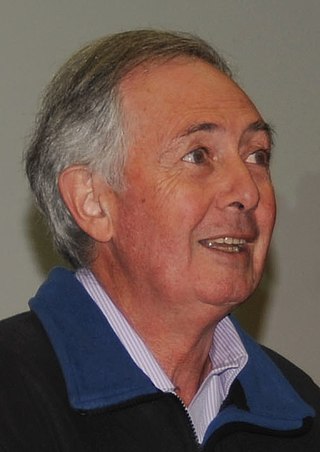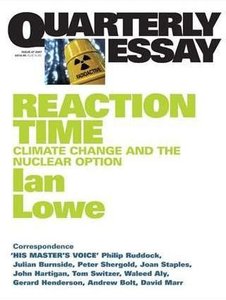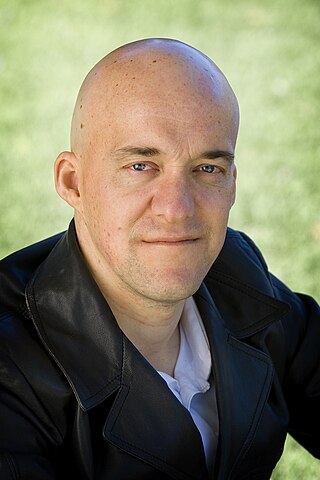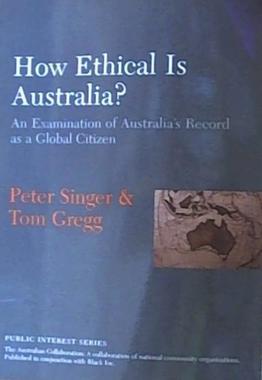Green anarchism, also known as ecological anarchism or eco-anarchism, is an anarchist school of thought that focuses on ecology and environmental issues. It is an anti-capitalist and anti-authoritarian form of radical environmentalism, which emphasises social organization, freedom and self-fulfillment.
Radical centrism, also called the radical center, the radical centre, and the radical middle, is a concept that arose in Western nations in the late 20th century. The radical in the term refers to a willingness on the part of most radical centrists to call for fundamental reform of institutions. The centrism refers to a belief that genuine solutions require realism and pragmatism, not just idealism and emotion.

The Australian Conservation Foundation (ACF) is Australia's national environmental organisation, launched in 1965 in response to a proposal by the World Wide Fund for Nature for a more co-ordinated approach to sustainability.
Ecocentrism is a term used by environmental philosophers and ecologists to denote a nature-centered, as opposed to human-centered, system of values. The justification for ecocentrism usually consists in an ontological belief and subsequent ethical claim. The ontological belief denies that there are any existential divisions between human and non-human nature sufficient to claim that humans are either (a) the sole bearers of intrinsic value or (b) possess greater intrinsic value than non-human nature. Thus the subsequent ethical claim is for an equality of intrinsic value across human and non-human nature, or biospherical egalitarianism.
Earth systems engineering and management (ESEM) is a discipline used to analyze, design, engineer and manage complex environmental systems. It entails a wide range of subject areas including anthropology, engineering, environmental science, ethics and philosophy. At its core, ESEM looks to "rationally design and manage coupled human–natural systems in a highly integrated and ethical fashion". ESEM is a newly emerging area of study that has taken root at the University of Virginia, Cornell and other universities throughout the United States, and at the Centre for Earth Systems Engineering Research (CESER) at Newcastle University in the United Kingdom. Founders of the discipline are Braden Allenby and Michael Gorman.

Ian Lowe is an Australian academic and writer focused on environmental issues. A physics graduate, he is an Emeritus Professor of Science, Technology and Society and former Head of the School of Science at Griffith University. He is also an adjunct professor at Sunshine Coast University and Flinders University.

Mark Diesendorf is an Australian academic and environmentalist, known for his work in sustainable development and renewable energy. He currently teaches environmental studies at the University of New South Wales, Australia. He was formerly professor of environmental science and founding director of the Institute for Sustainable Futures at the University of Technology, Sydney and before that a principal research scientist with CSIRO, where he was involved in early research on integrating wind power into electricity grids. His most recent book is Sustainable Energy Solutions for Climate Change.

A technological fix, technical fix, technological shortcut or (techno-)solutionism refers to attempts to use engineering or technology to solve a problem.
Hypermobile travelers are "highly mobile individuals" who take "frequent trips, often over great distances." They "account for a large share of the overall kilometres travelled, especially by air." These people contribute significantly to the overall amount of airmiles flown within a given society. Although concerns over hypermobility apply to several modes of transport, the environmental impact of aviation and especially its greenhouse gas emissions have brought particular focus on flying. Among the reasons for this focus is that these emissions, because they are made at high altitude, have a climate impact that is commonly estimated to be 2.7 higher, than the same emissions if made at ground-level.
The ecopedagogy movement is an outgrowth of the theory and practice of critical pedagogy, a body of educational praxis influenced by the philosopher and educator Paulo Freire. Ecopedagogy's mission is to develop a robust appreciation for the collective potentials of humanity and to foster social justice throughout the world. It does so as part of a future-oriented, ecological and political vision that radically opposes the globalization of ideologies such as neoliberalism and imperialism, while also attempting to foment forms of critical ecoliteracy. Recently, there have been attempts to integrate critical eco-pedagogy, as defined by Greg Misiaszek with Modern Stoic philosophy to create Stoic eco-pedagogy.
Living in the Hothouse: How Global Warming Affects Australia is a 2005 book by Professor Ian Lowe which is a sequel to his Living in the Greenhouse (1989). The book presents a detailed analysis of climate change science and the likely impact of climate change in Australia. Living in the Hothouse also offers a critical overview of the Howard government's policy response to climate change in Australia.

Reaction Time: Climate Change and the Nuclear Option is a book by Professor Ian Lowe which was officially launched by science broadcaster Robyn Williams at the Writers' Festival in Brisbane in September 2007. The book is about energy policy, and Lowe argues that nuclear power does not make sense on any level: economically, environmentally, politically or socially.

Barry William Brook is an Australian scientist. He is an ARC Australian Laureate Professor and Chair of Environmental Sustainability at the University of Tasmania in the Faculty of Science, Engineering & Technology. He was formerly an ARC Future Fellow in the School of Earth and Environmental Sciences at the University of Adelaide, Australia, where he held the Sir Hubert Wilkins Chair of Climate Change from 2007 to 2014. He was also Director of Climate Science at the Environment Institute.
Transition management is a governance approach that aims to facilitate and accelerate sustainability transitions through a participatory process of visioning, learning and experimenting. In its application, transition management seeks to bring together multiple viewpoints and multiple approaches in a 'transition arena'. Participants are invited to structure their shared problems with the current system and develop shared visions and goals which are then tested for practicality through the use of experimentation, learning and reflexivity. The model is often discussed in reference to sustainable development and the possible use of the model as a method for change.
Empowered democracy is a form of social-democratic arrangements developed by Brazilian philosopher and politician Roberto Mangabeira Unger, who first published his theories in 1987. Theorized in response to the repressiveness and rigidity of contemporary liberal democratic society, the theory of empowered democracy envisions a more open and more plastic set of social institutions through which individuals and groups can interact, propose change, and effectively empower themselves to transform social, economic, and political structures. The key strategy is to combine freedom of commerce and governance at the local level with the ability of political parties at the central level to promote radical social experiments that would bring about decisive change in social and political institutions.
Environmental theology pertains to "the God-environment relationship and divine expectations of human behavior in relation to the environment".

Radical sustainability is a movement that recognizes the holistic and integrated nature of sustainability, and according to the 2008 publication Toolbox for Radical Sustainable City Living by Scott Kellogg and Stacy Pettigrew, its main purpose is focused on the idea of addressing the root issues, versus their resulting symptoms. Though not a common enough term to be directly mentioned in many organizations or policy, its foundational principles and concepts can be seen in practice across many disciplines such as architecture and design. The term is relatively new, appearing in the last one hundred years, though arguments have been made that the concept has existed throughout human history, affecting industry, social systems, and urbanization long before the term existed. In reflection of this, in recent years, theorists of radical sustainability have pointed to recent policies passed in the United States as examples of this movement's principles becoming more mainstream and accepted in modern practices. The movement is not without its criticism, launching from concern over its potential to incite drastic change in economic and social practices, and the push to enforce this change leading to an oppressive state infringing on personal liberties
Eco-socialism is an ideology merging aspects of socialism with that of green politics, ecology and alter-globalization or anti-globalization. Eco-socialists generally believe that the expansion of the capitalist system is the cause of social exclusion, poverty, war and environmental degradation through globalization and imperialism, under the supervision of repressive states and transnational structures.

How Ethical is Australia? An Examination of Australia's Record as a Global Citizen is a 2004 book by Peter Singer and Tom Gregg, in which the authors apply moral philosophy to examine Australia's domestic, environmental and foreign policies.








